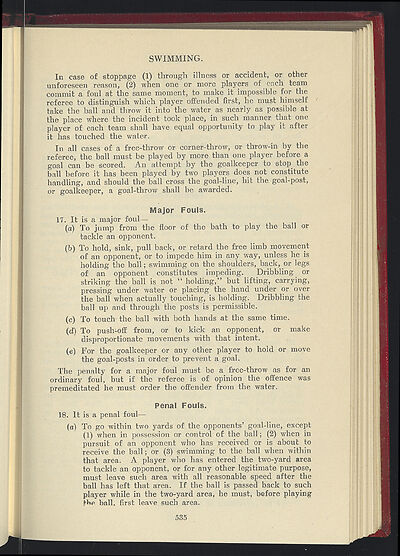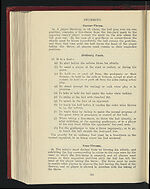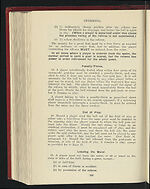1936-37
(559)
Download files
Complete book:
Individual page:
Thumbnail gallery: Grid view | List view

SWIMMING.
In case of stoppage (1) through illness or accident, or other
unforeseen reason, (2) when one or more players of each team
commit a foul at the same moment, to make it impossible for the
referee to distinguish which player offended first, he must himself
take the ball and throw it into the water as nearly as possible at
the place where the incident took place, in such manner. that one
player of each team shall have equal opportunity to play it after
it has touched the water.
In all cases of a free-throw or corner-throw, or throw-in by the
referee, the ball must be played by more than one player before a
goal can be scored. An attempt by the goalkeeper to stop the
ball before it has been played by two players does not constitute
handling, and should the ball cross the goal-line, hit the goal-post,
or goalkeeper, a goal-throw shall be awarded.
Major Fouls.
17. It is a major foul—
(a) To jump from the floor of the bath to play the ball or
tackle an opponent.
(b) To hold, sink, pull back, or retard the free limb movement
of an opponent, or to impede him in any way, unless he is
holding the ball; swimming on the shoulders, back,
or
legs
of an opponent constitutes impeding. Dribbling or
striking the ball is not " holding," but lifting, carrying,
pressing under water or placing the hand under or over
the ball when actually touching, is holding. Dribbling the
ball up and through the posts is permissible.
(c) To touch- the ball with both hands at the same time.
(d) To push-off from, or to kick an opponent, or make
disproportionate movements with that intent.
(e) For the goalkeeper or any other player to hold or move
the goal-posts in order to prevent a goal.
The penalty for a major foul must be a free-throw as for an
ordinary foul, but if the referee is of opinion the offence was
premeditated he must order the offender from the water.
Penal Fouls.
18. It is a penal foul—
(a) To go within two yards of the opponents' goal-line, except
(1) when in possession or control of the ball; (2) when in
pursuit of an opponent who has received or is about to
receive the ball; or (3) swimming to the ball when within
that area. A player who has entered the two-yard area
to tackle an opponent, or for any other legitimate purpose,
must leave such area with all reasonable speed after the
ball has left that area. If the ball is passed back to such
player while in the two-yard area, he must, before playing
bhpp ball. first leave such area.
In case of stoppage (1) through illness or accident, or other
unforeseen reason, (2) when one or more players of each team
commit a foul at the same moment, to make it impossible for the
referee to distinguish which player offended first, he must himself
take the ball and throw it into the water as nearly as possible at
the place where the incident took place, in such manner. that one
player of each team shall have equal opportunity to play it after
it has touched the water.
In all cases of a free-throw or corner-throw, or throw-in by the
referee, the ball must be played by more than one player before a
goal can be scored. An attempt by the goalkeeper to stop the
ball before it has been played by two players does not constitute
handling, and should the ball cross the goal-line, hit the goal-post,
or goalkeeper, a goal-throw shall be awarded.
Major Fouls.
17. It is a major foul—
(a) To jump from the floor of the bath to play the ball or
tackle an opponent.
(b) To hold, sink, pull back, or retard the free limb movement
of an opponent, or to impede him in any way, unless he is
holding the ball; swimming on the shoulders, back,
or
legs
of an opponent constitutes impeding. Dribbling or
striking the ball is not " holding," but lifting, carrying,
pressing under water or placing the hand under or over
the ball when actually touching, is holding. Dribbling the
ball up and through the posts is permissible.
(c) To touch- the ball with both hands at the same time.
(d) To push-off from, or to kick an opponent, or make
disproportionate movements with that intent.
(e) For the goalkeeper or any other player to hold or move
the goal-posts in order to prevent a goal.
The penalty for a major foul must be a free-throw as for an
ordinary foul, but if the referee is of opinion the offence was
premeditated he must order the offender from the water.
Penal Fouls.
18. It is a penal foul—
(a) To go within two yards of the opponents' goal-line, except
(1) when in possession or control of the ball; (2) when in
pursuit of an opponent who has received or is about to
receive the ball; or (3) swimming to the ball when within
that area. A player who has entered the two-yard area
to tackle an opponent, or for any other legitimate purpose,
must leave such area with all reasonable speed after the
ball has left that area. If the ball is passed back to such
player while in the two-yard area, he must, before playing
bhpp ball. first leave such area.
Set display mode to:
![]() Universal Viewer |
Universal Viewer | ![]() Mirador |
Large image | Transcription
Mirador |
Large image | Transcription
| Games and sports in the army > 1936-37 > (559) |
|---|
| Permanent URL | https://digital.nls.uk/248725205 |
|---|
| Description | 'Games and Sports in the Army' was an annual publication produced by the British War Office between the 1930s and 1960s. This included the Second World War. It outlines the rules and regulations for games and sports played by members of the armed forces. It features names and photographs of team members, and examples of contemporary advertising. |
|---|---|
| Shelfmark | GWB.52 |

